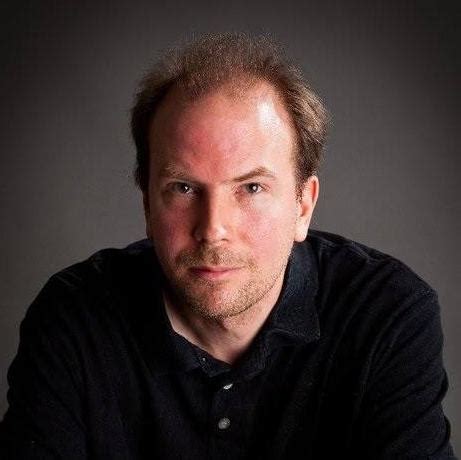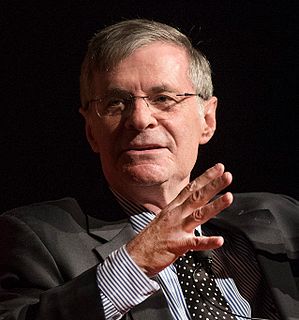A Quote by J. K. Rowling
They were the reason that he kept faith with his stars, that reinforced him in his belief that the universe had more in store for him than the mug's game of working for a modest salary until he retired or died.
Related Quotes
I wrote this [Most Kings] before MJ died, and his death only proves my point: When he was alive, the King of Pop, people were tireless in taking him down, accepting as truth every accusation people made against him, assuming the worst until they drove him away. When he died, suddenly he was beloved again - people realized that the charges against him might really have been bogus, and that the skin lightening was really caused by a disease, and that his weirdness was part of his artistry. But when he was alive and on top, they couldn't wait to bring him down.
His books were part of him. Each year of his life, it seemed, his books became more and more a part of him. This room, thirty by twenty feet, and the walls of shelves filled with books, had for him the murmuring of many voices. In the books of Herodotus, Tacitus, Rabelais, Thomas Browne, John Milton, and scores of others, he had found men of face and voice more real to him than many a man he had met for a smoke and a talk.
For here we are so blind and foolish that we never seek God until he, of his goodness, shows himself to us. It is when we do see something of him by his grace that we are stirred by that same grace to seek him, and with earnest longing to see still more of his blessedness. So I saw him and sought him; I had him and wanted him. It seems to me that this is and should be an experience common to us all.
Christianity set itself the goal of fulfilling man’s unattainable desires, but for that very reason ignored his attainable desires. By promising man eternal life, it deprived him of temporal life, by teaching him to trust in God’s help it took away his trust in his own powers; by giving him faith in a better life in heaven, it destroyed his faith in a better life on earth and his striving to attain such a life. Christianity gave man what his imagination desires, but for that very reason failed to give him what he really and truly desires.
The most important element in human life is faith; if God were to take away all his blessings-health, physical fitness, wealth, intelligence-and leave me with but one gift I would ask him for faith. For with faith in him and his goodness, mercy and love for me, and belief in everlasting life, I believe I could suffer the loss of all my other gifts and still be happy.
Isaac Newton was born at Woolsthorpe, near Grantham, in Lincolnshire, on Christmas Day, 1642: a weakly and diminutive infant, of whom it is related that, at his birth, he might have found room in a quart mug. He died on March the 20th, 1727, after more than eighty-four years of more than average bodily health and vigour; it is a proper pendant to the story of the quart mug to state that he never lost more than one of his second teeth.
I kept glancing at him and away from him, as if his green eyes were hurting me. In modern parlance he was a laser beam. Deadly and delicate he seemed. His victims had always loved him. And I had always loved him, hadn't I, no matter what happened, and how strong could love grow if you had eternity to nourish it, and it took only these few moments in time to renew its momentum, its heat? -Lestat
Atten. Pray of what disease did Mr. Badman die, for now I perceive we are come up to his death? Wise. I cannot so properly say that he died of one disease, for there were many that had consented, and laid their heads together to bring him to his end. He was dropsical, he was consumptive, he was surfeited, was gouty, and, as some say, he had a tang of the pox in his bowels. Yet the captain of all these men of death that came against him to take him away, was the consumption, for it was that that brought him down to the grave.
I have been lately introduced to the famous Thomas Paine, and like him very well. He is vain beyond all belief, but he has reason to be vain, and for my part I forgive him. He has done wonders for the cause of liberty, both in America and Europe, and I believe him to be conscientiously an honest man. He converses extremely well; and I find him wittier in discourse than in his writings, where his humour is clumsy enough.
Man is only a reed, the weakest in nature, but he is a thinking reed. There is no need for the whole universe to take up arms to crush him: a vapour, a drop of water is enough to kill him. but even if the universe were to crush him, man would still be nobler than his slayer, because he knows that he is dying and the advantage the universe has over him. The universe knows none of this.
Often nothing keeps the pupil on the move but his faith in his teacher, whose mastery is now beginning to dawn on him .... How far the pupil will go is not the concern of the teacher and master. Hardly has he shown him the right way when he must let him go on alone. There is only one thing more he can do to help him endure his loneliness: he turns him away from himself, from the Master, by exhorting him to go further than he himself has done, and to "climb on the shoulders of his teacher."
Belief is in a sense passive, an agreement or acceptance only; faith is active and positive, embracing such reliance and confidence as will lead to works. Faith in Christ comprises belief in Him, combined with trust in Him. One cannot have faith without belief; yet he may believe and still lack faith. Faith is vivified, vitalized, living belief.



































